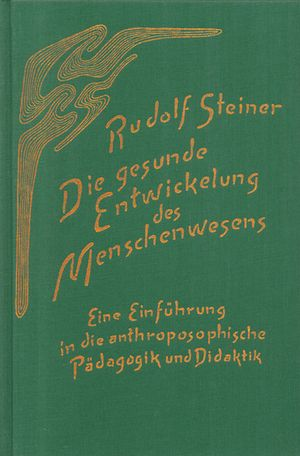GA 303


The Healthy Development of the Human Being. An Introduction to Anthroposophical Pedagogy and Didactics
Die gesunde Entwickelung des Menschenwesens. Eine Einführung in die anthroposophische Pädagogik und Didaktik
Sixteen lectures and three answers to questions, Dornach 23 December 1921 to 7 January 1922 (Christmas course for teachers).
In this comprehensive introductory series of lectures Rudolf Steiner presents fundamental humanistic themes and their relation to pedagogy and didactics, especially with regard to the different age groups. This is followed by explanations of the inner structure and outer design of the Waldorf school. The course concludes with three lectures on aesthetic, physical and ethical and religious education in particular.
Today's schools fill children's heads with information instead of helping them develop their natural human faculties and capacities. They place too much stress on memory, leading to inner exhaustion instead of real learning for a healthy, fulfilling life.
The important lectures in this volume were given in Dornach, Switzerland, to leading educators, including many from England. As a result, he was invited to Oxford to expand on some ot the themes presented in these talks.
Steiner begins by placing Anthroposophy as the foundation for understanding the principles behind Waldorf education. In what follows, he describes an education based on the human as a continually developing being of body, soul, and spirit. From this perspective, Waldorf education depends on the teacher's ability to observe and respond to each stage of a child's development. Steiner shows how Waldorf education emphasizes the efficient use of children's inner energies and how children can be nurtured through their natural stages of development by giving them just what they need at the right time--an approach that Steiner calls "soul economy."
These detailed and accessible lectures give parents and teachers the keys to a much-needed renewal of education for our children and their future.
Contents
Editor's Introduction
Introductory Note by Rudolf Steiner
1. The Three Phases of the Anthroposophic Movement (December 23, 1921)
2. Education Based on Knowledge of the Human Being, part 1 (December 24, 1921)
3. Education Based on Knowledge of the Human Being, part 2 (December 25, 1921)
4. Education Based on Knowledge of the Human Being, part 3 (December 26, 1921)
5. Health and Illness, part 1 (December 27, 1921)
6. Health and Illness, part 2 (December 28, 1921)
7. Children before the Seventh Year (December 29, 1921)
8. The Waldorf School (December 30, 1921)
9. Children from the Seventh to the Tenth Years (December 31, 1921)
10. Children in the Tenth Year (January 1, 1922)
11. Children from the Tenth to the Fourteenth Years, part 1 (January 2, 1922)
12. Children from the Tenth to the Fourteenth Years, part 2 (January 3, 1922)
13. Adolescents after the Fourteenth Year (January 4, 1922)
14. Esthetic Education (January 5, 1922)
15. Physical Education (January 6, 1922)
16. Religious & Moral Education (January 7, 1922)
Appendix: Questions & Answers
The Foundations of Waldorf Education
Rudolf Steiner's Lectures and Writings on Education
Index
Literature
- Rudolf Steiner, Roland Everett (Translator): Soul Economy: Body, Soul, and Spirit in Waldorf Education. CW 303. Anthroposophic Press 2014. ISBN 978-0880105170; eBook ASIN B006VED05Q
German
- Rudolf Steiner: Die gesunde Entwickelung des Menschenwesens. Eine Einführung in die anthroposophische Pädagogik und Didaktik., GA 303 (1978), ISBN 3-7274-3031-1 English: rsarchive.org German: pdf pdf(2) html mobi epub archive.org
 |
References to the work of Rudolf Steiner follow Rudolf Steiner's Collected Works (CW or GA), Rudolf Steiner Verlag, Dornach/Switzerland, unless otherwise stated.
Email: verlag@steinerverlag.com URL: www.steinerverlag.com. Index to the Complete Works of Rudolf Steiner - Aelzina Books A complete list by Volume Number and a full list of known English translations you may also find at Rudolf Steiner's Collected Works Rudolf Steiner Archive - The largest online collection of Rudolf Steiner's books, lectures and articles in English. Rudolf Steiner Audio - Recorded and Read by Dale Brunsvold steinerbooks.org - Anthroposophic Press Inc. (USA) Rudolf Steiner Handbook - Christian Karl's proven standard work for orientation in Rudolf Steiner's Collected Works for free download as PDF. |
